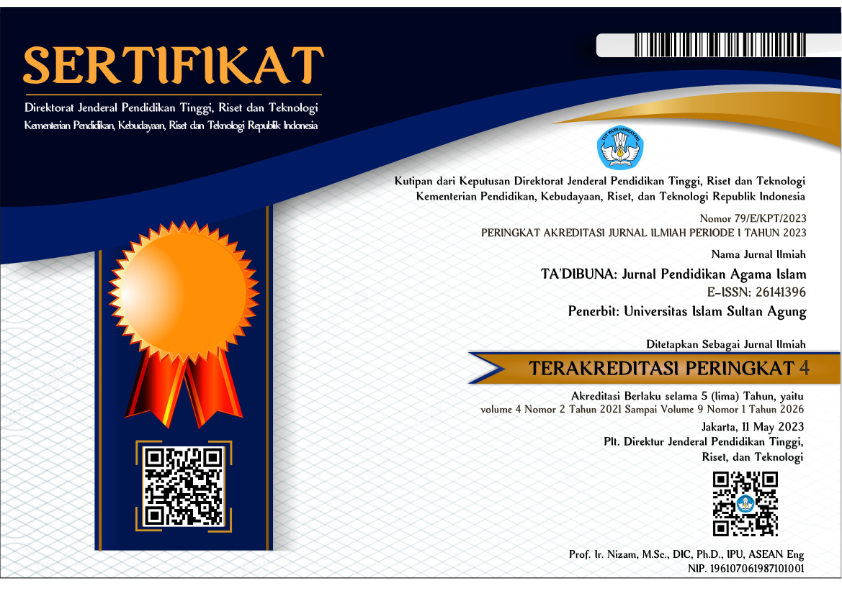Teacher’s Perspective on Student Center Learning Paradigm in Inclusive Madrasa
Abstract
Keywords
Full Text:
PDFReferences
Abu Bakar, M. Y., Baharun, H., & Hasanah, M. (2021). Build public trust through excellent service in school. Al-Tanzim: Jurnal Manajemen Pendidikan Islam, 5(3), 106–117.
Berata, I. W. (2022). Paradigma Pengajaran dari Pembelajaran TCL (Teacher Center Learning) Menuju SCL (Student Center Learning). Inovasi Jurnal Guru, 8(8), 50–55.
Cahyani, A. R. (2022). Implementasi Undang-Undang Nomor 8 Tahun 2016 Tentang Penyandang Disabilitas Dalam Pelayanan Hak Penyandang Disabilitas (Studi Forum Komunikasi Keluarga Anak Dengan Kecacatan (FKKADK) [PhD Thesis, Universitas Islam Riau]. https://repository.uir.ac.id/id/eprint/14439
Chng, L. S., & Lund, J. (2018). Assessment for learning in physical education: The what, why and how. Journal of Physical Education, Recreation & Dance, 89(8), 29–34. https://doi.org/10.1080/07303084.2018.1503119
Dewey, J. (1997). Democracy and education. The Free Press.
Double, K. S., McGrane, J. A., & Hopfenbeck, T. N. (2020). The impact of peer assessment on academic performance: A meta-analysis of control group studies. Educational Psychology Review, 32(2), 481–509. https://psycnet.apa.org/doi/10.1007/s10648-019-09510-3
Faiz, A., Pratama, A., & Kurniawaty, I. (2022). Pembelajaran Berdiferensiasi dalam Program Guru Penggerak pada Modul 2.1. Jurnal Basicedu, 6(2), 2846–2853.
Forlin, C. (2013). Changing paradigms and future directions for implementing inclusive education in developing countries. Asian Journal of Inclusive Education, 1(2), 19–31.
Herwina, W. (2021). Optimalisasi kebutuhan murid dan hasil belajar dengan pembelajaran berdiferensiasi. PERSPEKTIF Ilmu Pendidikan, 35(2), 175–182. https://dx.doi.org/10.21009/PIP.352.10
Kaymakamoglu, S. E. (2018). Teachers’ Beliefs, Perceived Practice and Actual Classroom Practice in Relation to Traditional (Teacher-Centered) and Constructivist (Learner-Centered) Teaching (Note 1). Journal of Education and Learning, 7(1), 29–37. https://doi.org/10.5539/jel.v7n1p29
Keiler, L. S. (2018). Teachers’ roles and identities in student-centered classrooms. International Journal of STEM Education, 5(1), 1–20. https://doi.org/10.1186/s40594-018-0131-6
Kurniawan, N. A., & Aiman, U. (2020). Paradigma Pendidikan Inklusi Era Society 5.0. Prosiding Seminar Dan Diskusi Pendidikan Dasar.
Kurniawan, R. (2019). Implementation of Religious Values on Individual Education Program (IEP) Based in Islamic Elementary School. JPK (Jurnal Pendidikan Khusus), 15(1), 1–8. https://doi.org/10.21831/jpk.v15i1.26134
Mansur, H., Utama, A. H., Mohd Yasin, M. H., Sari, N. P., Jamaludin, K. A., & Pinandhita, F. (2023). Development of Inclusive Education Learning Design in the Era of Society 5.0. Social Sciences, 12(1), Article 1. https://doi.org/10.3390/socsci12010035
Marlina, M. (2019). Panduan Pelaksanaan Model Pembelajaran Berdiferensiasi di Sekolah Inklusif.
Mitchell, D. R. (2004). Special educational needs and inclusive education: Assessment and teaching strategies (Vol. 3). Taylor & Francis.
Panggabean, S. P., S. Pd, Lisnasari, S. F., Puspitasasri, I., Basuki, L., fuadi, A. F., & Anwar, A. (2021). Sistem Student Center Learning dan Teacher Center Learning. Media Sains Indonesia.
Paris, C., & Gespass, S. (2001). Examining the mismatch between learner-centered teaching and teacher-centered supervision. Journal of Teacher Education, 52(5), 398–412. https://doi.org/10.1177/0022487101052005006
Rock, M. L., Gregg, M., Ellis, E., & Gable, R. A. (2008). REACH: A framework for differentiating classroom instruction. Preventing School Failure: Alternative Education for Children and Youth, 52(2), 31–47. https://doi.org/10.3200/PSFL.52.2.31-47
Serin, H. (2018). A comparison of teacher-centered and student-centered approaches in educational settings. International Journal of Social Sciences & Educational Studies, 5(1), 164–167. https://doi.org/10.23918/ijsses.v5i1p164
Siddiqui, U., & Khatoon, T. (2013). Teaching physical science: Should we implement teacher-centered CAI or student-centered CAI at secondary school level in India? European Scientific Journal, 9(10). https://doi.org/10.19044/esj.2013.v9n10p%25p
Skinner, B. F. (1974). About Behavioraism. Random House Publishing Group.
Tomlinson, C. A. (1999). Mapping a route toward differentiated instruction. Educational Leadership, 57, 12–17.
Vygotsky, L. (1978). Mind in society. Harvard.
Yin, R. K. (2009). Case Study Research: Design and Methods. SAGE.
Zaini, N. (2019). Konsep Pendidikan Humanis dan Implementasinya dalam Proses Belajar Mengajar. Karangan: Jurnal Bidang Kependidikan, Pembelajaran, Dan Pengembangan, 1(01), 62–72. https://dx.doi.org/10.55273/karangan.v1i01.7
DOI: https://dx.doi.org/10.30659/jpai.6.1.1-9
Refbacks
- There are currently no refbacks.
Ta’dibuna: Jurnal Pendidikan Agama Islam is published by the Master Program of Islamic Education, Faculty of Islamic Studies, Universitas Islam Sultan Agung (UNISSULA), Indonesia.
Jl. Raya Kaligawe Km. 4, PO BOX 1054/SM, Semarang, Indonesia 50112
Email: jurnaltadibuna@unissula.ac.id








